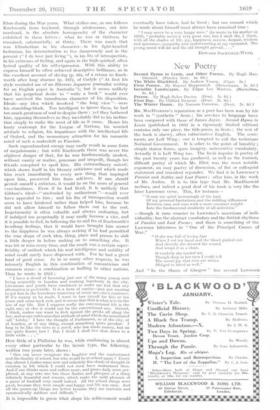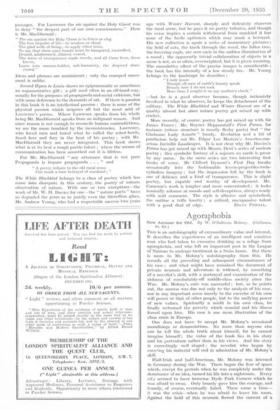New Poetry
Second Hymn to Lenin, and Other Poems. By Hugh Mac.- Diarmid. (Stanley Nett. 3s. 6c1.) The White Blackbird. By Andrew Young. (Cape. 5s.) First Poems By Rayner Ilepponstall. (Heinemann, 3s. 6d.) Invisible Landscapes. By Edgar Lee Masters. (Macmillan, 8s. 6d.) Petron. By Hugh Sykes Davies. (Dent. 2s, 6d.) First Day. By Clifford Dyment. (Dent. 2s. 6d.) The Winter House. By Norman Cameron. (Dent. 2s. 6d.)
MR. MACDIAIUIID'S reputation as a poet has been won by his work in " synthetic " Scots ; his services to language have been compared with those of James Joyce. Second Hymn to Lenin (published in 1932 in a rigorously limited edition) contains only one piece, the title-poem, in Scots ; the rest of the book is sinewy, oft en ratiocinative English. The senti- ments are Left Wing ; one is tempted to call the technique National Government. It is sober to the point of banality; simple stanza forms, spare imagery, uninventive vocabulary. Actually it is Left Wing too. The fresh impulse in poetry of the past twenty years has produced, as well as the learned; difficult poetry of which Mr. Eliot was the most notable exponent, an easy poetry of discussion, of flat or colloquial statement and truculent rejoinder. We find it in Lawrence's Pansies and Nettles and Last Poems ; after him, in the work of Mr. Auden. It is to this type that Mr. MaeDiarmid inclines, and indeed a good deal of his book is very like the later Lawrence verse. This, for instance- " 0 ease my spirit increasingly of the load
Of my personal limitations and the riddling differences Between man and roan with a more constant insight Into the fundamental similarity of all activities."
—though it runs counter to Lawrence's assertions of indi- viduality, has the abstract vocabulary and the flattish rhythms
of Pansies and Last Poems; and there' is something of the Lawrence bitterness in " One of the Principal Causes of
War." " O she was full of loving fuss When I out my hand and the blood gushed out And cleverly she dressed the wound And wrupt it in a clout.
O tenderly she tended me Though deep M her eyes I could tell The secret joy that men are whiles Obliged to bleed as well."
In the Slums of Glasgow " has several Lawrence And 64
passages. For Lawrence the sin against the Holy Ghost was to deny " the deepest part of our own consciousness." Here is Mr. MacDiarmid " The sin against tho Holy Ghost is to fetter or clog The free impulse of life—to weaken or cloud The glad wells of being—to apply other tests, To say that these pure founts must be hampered, controlled, Denied, adulterated, diluted, cowed, The wave of omnipotence made recede, and all these lives, these lovers, • Lapse into cannon-fodder, sub-humanity, the despised shun- crowd," Ideas and phrases are reminiscent ; only the cramped move- ment is unlike.
Second Hymn to Lenin shows an epigrammatic or sometimes an argumentative gift ; a gift used often in an off-hand way, usually for the purposes of propaganda and social criticism, but with some deference to the demands of art. If there is passion
in this book it is an intellectual passion : there is none of the physical paSsion which irrigates all but the most arid of Lawrence's poems. Where Lawrence speaks from his whole being Mr. MacDiarmid speaks from an indignant reason. And since reason is not enough to reconcile human contradictions, we are' the more troubled by the inconsistencies. Lawrence, who loved men and hated what he called the robot-herds, fused love and fury in the heat of his poetry ; with Mr. MacDiaimid they are never integrated. This book shows what is at its best a rough poetic talent ; where the means of communication has been smoothed out it is lifeless.
For .Mr. MaeDiarmid " any utterance that is not Propaganda is impure propaganda . . . " and
" A pretty tribute to tho old rural scene Can mask a base betrayal of mankind ; " The While Blackbird belongs to a class of poetry which has come into disrepute in this century, the poetry of minute observation of nature. With one or two exceptions—the work of Mr. W. H. Davies for one—the " nature poets " have so degraded the genre as to justify even the Sitwellian gibes. Mr. Andrew Young, who had a respectable success two years
pure
ago with Winter Harvest, sharply and delicately observes
• the rural scene, but he pays it no pretty tributes, and though • his verse implies a certain withdrawal from mankind it has ' none of the facile optimism which may mask a betrayal. IBS new collection is again a series of momentary pictures ; the field of oats, the track through the wood, the fallen tree, the hovering eagle, are seen each in the sudden illumination of
• a Mood ; the apparently trivial collaboration of objects in a scene is not, as so often, overweighted, but it is given meaning. The cumulative effect of the precise images is considerable ; the book has the intensity of a low steady fire. Mr. Young
belongs to the landscape he describes : " I only know Though all men of earth's beauty speak
Beauty here I do not seek
More than I sought it on my mother's cheek."
—but he is a good observer because, though intimately involved in what he observes, he keeps the detachment of the solitary. The White Blackbird and Winter harvest are of a quality almost lost since nature poetry got mixed up with cricket.
More recently, of course, poetry has got mixed up with Sir James Frazer ; Mr. Rayner Heppenstall's First Poems, for
instance (whose structure is mostly fleshy parts) find " the Gladsome Lady Astarte" handy. Evolution and a bit of
pantheism help out Mr. Edgar Lee Masters's America-con- scious Invisible Landscapes. It is not clear why Mr. Davies's Petron has got mixed up with Messrs. Dent's series of modern poetry ; this symbolic fantasy of a sojourn on earth is prose by any name. In the same series are two interesting first books of verse. Mr Clifford Dyment's First Day breaks occasionally into the fashionable levers-projectiles-twin- cylinders imagery ; but the impression left by the book is one of delicacy and a kind of transparence. This is slight poetry, but capable and worthy of development. Mr. Cameron's work is tougher and more concentrated ; it looks ironically askance at moods and self-deceptions, always ready with acid comment. The style is allusive and symbolical, the outline a trifle knotty ; a critical, unexpansive talent











































 Previous page
Previous page